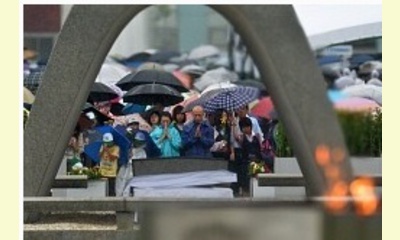|
|
Hiroshima peace declaration on 69th anniversary of atomic bombing
an article by Mainichi, Japan
The following text is the full peace declaration issued on Aug.
6, 2014, by Hiroshima Mayor Kazumi Matsui on the 69th
anniversary of the atomic bombing of the city. 
People put their hands together to mourn the victims of the Hiroshima atomic bombing in front of the cenotaph for the A-bomb victims at Peace Memorial Park in Hiroshima's Naka Ward on Aug. 6, 2014. (Mainichi)
click on photo to enlarge
Summer, 69 years later. The burning sun takes us back to
"that day." August 6, 1945. A single atomic bomb renders
Hiroshima a burnt plain. From infants to the elderly, tens of
thousands of innocent civilians lose their lives in a single day.
By the end of the year, 140,000 have died. To avoid forgetting
that sacred sacrifice and to prevent a repetition of that
tragedy, please listen to the voices of the survivors.
Approximately 6,000 young boys and girls died removing
buildings for fire lanes. One who was a 12-year-old junior
high student at the time says, "Even now, I carry the scars of
war and that atomic bombing on my body and in my heart.
Nearly all my classmates were killed instantly. My heart is
tortured by guilt when I think how badly they wanted to live
and that I was the only one who did." Having somehow
survived, hibakusha still suffer from severe physical and
emotional wounds.
"Water, please." Voices from the brink of death are still lodged
in the memory of a boy who was 15 and a junior high student.
The pleas were from younger students who had been
demolishing buildings. Seeing their badly burned, grotesquely
swollen faces, eyebrows and eyelashes singed off, school
uniforms in ragged tatters due to the heat ray, he tried to
respond but was stopped. "'Give water when they're injured
that bad and they'll die, boy,' so I closed my ears and refused
them water. If I had known they were going to die anyway, I
would have given them all the water they wanted." Profound
regret persists.
People who rarely talked about the past because of their
ghastly experiences are now, in old age, starting to open up.
"I want people to know the true cruelty of war," says an A-
bomb orphan. He tells of children like himself living in a city
of ashes, sleeping under bridges, in the corners of burned-
out buildings, in bomb shelters, having nothing more than the
clothes on their backs, stealing and fighting to eat, not going
to school, barely surviving day to day working for gangsters.
Immediately after the bombing, a 6-year-old first grader
hovered on the border between life and death. Later, she lived
a continual fearful struggle with radiation aftereffects. She
speaks out now because, "I don't want any young people to go
through that experience." After an exchange with non-
Japanese war victims, she decided to convey the importance of
"young people making friends around the world," and
"unceasing efforts to build, not a culture of war, but a culture
of peace."
(This article is continued in the discussionboard)
|








|
DISCUSSION
There is no question yet associated with this article.
* * * * *
LATEST READER COMMENT:
(The following is continued from the main article listed above.)
The "absolute evil" that robbed children of loving families and dreams for the future, plunging their lives into turmoil, is not susceptible to threats and counter-threats, killing and being killed. Military force just gives rise to new cycles of hatred. To eliminate the evil, we must transcend nationality, race, religion, and other differences, value person-to-person relationships, and build a world that allows forward-looking dialogue.
Hiroshima asks everyone throughout the world to accept this wish of the hibakusha and walk with them the path to nuclear weapons abolition and world peace.
Each one of us will help determine the future of the human family. Please put yourself in the place of the hibakusha. Imagine their experiences, including that day from the depths of hell, actually happening to you or someone in your family. To make sure the tragedies of Hiroshima and Nagasaki never happen a third time, let's all communicate, think and act together with the hibakusha for a peaceful world without nuclear weapons and without war.
We will do our best. Mayors for Peace, now with over 6,200 member cities, will work through lead cities representing us in their parts of the world and in conjunction with NGOs and the UN to disseminate the facts of the bombings and the message of Hiroshima. We will steadfastly promote the new movement stressing the humanitarian consequences of nuclear weapons and seeking to outlaw them. . ...more.

|
|









